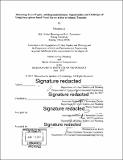| dc.contributor.advisor | P. Christopher Zegras. | en_US |
| dc.contributor.author | Li, Menghan, M.C.P. Massachusetts Institute of Technology | en_US |
| dc.contributor.other | Massachusetts Institute of Technology. Department of Civil and Environmental Engineering. | en_US |
| dc.coverage.spatial | f-tz--- | en_US |
| dc.date.accessioned | 2017-09-15T15:32:25Z | |
| dc.date.available | 2017-09-15T15:32:25Z | |
| dc.date.copyright | 2017 | en_US |
| dc.date.issued | 2017 | en_US |
| dc.identifier.uri | http://hdl.handle.net/1721.1/111398 | |
| dc.description | Thesis: M.C.P., Massachusetts Institute of Technology, Department of Urban Studies and Planning, 2017. | en_US |
| dc.description | Thesis: S.M. in Transportation, Massachusetts Institute of Technology, Department of Civil and Environmental Engineering, 2017. | en_US |
| dc.description | Cataloged from student-submitted PDF version of thesis. | en_US |
| dc.description | Includes bibliographical references (pages 166-175). | en_US |
| dc.description.abstract | Dar es Salaam is one of numerous large cities in the developing countries facing tremendous development challenges: growing population, rapid urbanization and motorization, sprawled informal settlements, problematic informal transit operations, and poor and unequal infrastructure service. One major problem Dar faces in overcoming its mobility challenges is lack of quality data. This thesis capitalizes upon a unique opportunity to demonstrate the potential value that mobile telephony presents for transportation planning purposes in Dar and other cities of the Global South. Based on the smartphone-based travel survey data collected by the World Bank from 581 Dar residents for a 4-week period in November-December 2015, this thesis identifies travel patterns depicted by the data, analyzes the representativeness of participants, and demonstrates how the data can be used to help evaluate travel equity in the city. Although the pilot implementation reveals several technical and social challenges in adopting this data collection technology in the African context, it demonstrates promising opportunities in such technology. First, the high-resolution data suggest more precise representation of travel behaviors, compared to traditional paper-based surveys; the smartphone-based survey records higher trip rates, more work-related and private leisure trip-making, and more short-distance travel. Second, little observable bias exists in the likelihood of participation among different socio-demographic groups; except for people with fewer education years and who work for government, no significantly lower likelihood of participation is found among other socio-demographic attributes. Third, the richness of smartphone-based data makes it possible to operationalize new ways to systematically evaluate travel equity in the African city. The ellipse-measured monthly activity space and network-based daily activity space both suggest high travel inequity among participants in Dar. However, although accessibility is unequal (equality of welfare), it is the differences in willingness and ability to pay, rather than the differences in returns on travel welfare investment (equality of effectiveness), that lead to high inequity of travel welfare. Overall, this thesis can help guide future mobility technology-based data collection methods and facilitate the development of evidence-based smart and sustainable planning decisions for Dar and other rapidly developing regions. | en_US |
| dc.description.statementofresponsibility | by Menghan Li. | en_US |
| dc.format.extent | 179 pages | en_US |
| dc.language.iso | eng | en_US |
| dc.publisher | Massachusetts Institute of Technology | en_US |
| dc.rights | MIT theses are protected by copyright. They may be viewed, downloaded, or printed from this source but further reproduction or distribution in any format is prohibited without written permission. | en_US |
| dc.rights.uri | http://dspace.mit.edu/handle/1721.1/7582 | en_US |
| dc.subject | Urban Studies and Planning. | en_US |
| dc.subject | Civil and Environmental Engineering. | en_US |
| dc.title | Measuring travel equity and representativeness : opportunities and challenges of using smartphone-based travel survey in Dar es Salaam, Tanzania | en_US |
| dc.title.alternative | Opportunities and challenges of using smartphone-based travel survey in Dar es Salaam, Tanzania | en_US |
| dc.type | Thesis | en_US |
| dc.description.degree | M.C.P. | en_US |
| dc.description.degree | S.M. in Transportation | en_US |
| dc.contributor.department | Massachusetts Institute of Technology. Department of Civil and Environmental Engineering | |
| dc.contributor.department | Massachusetts Institute of Technology. Department of Urban Studies and Planning | |
| dc.identifier.oclc | 1003291922 | en_US |
